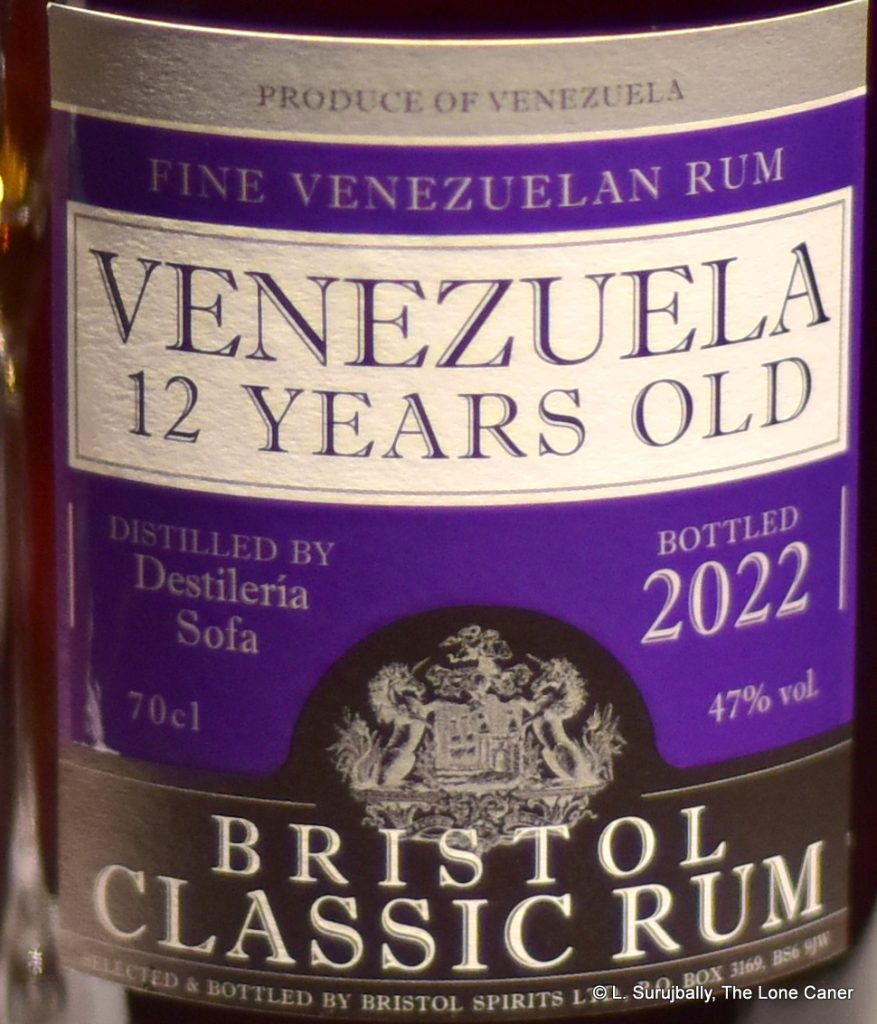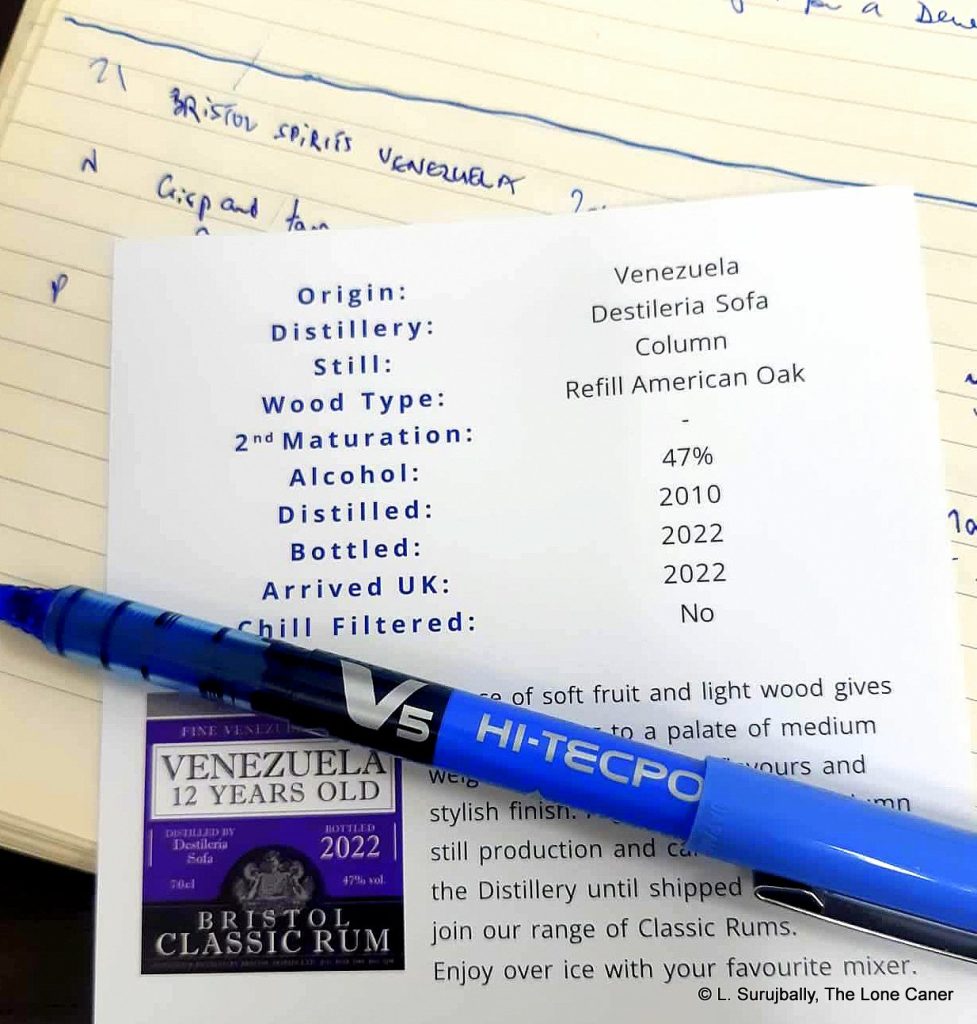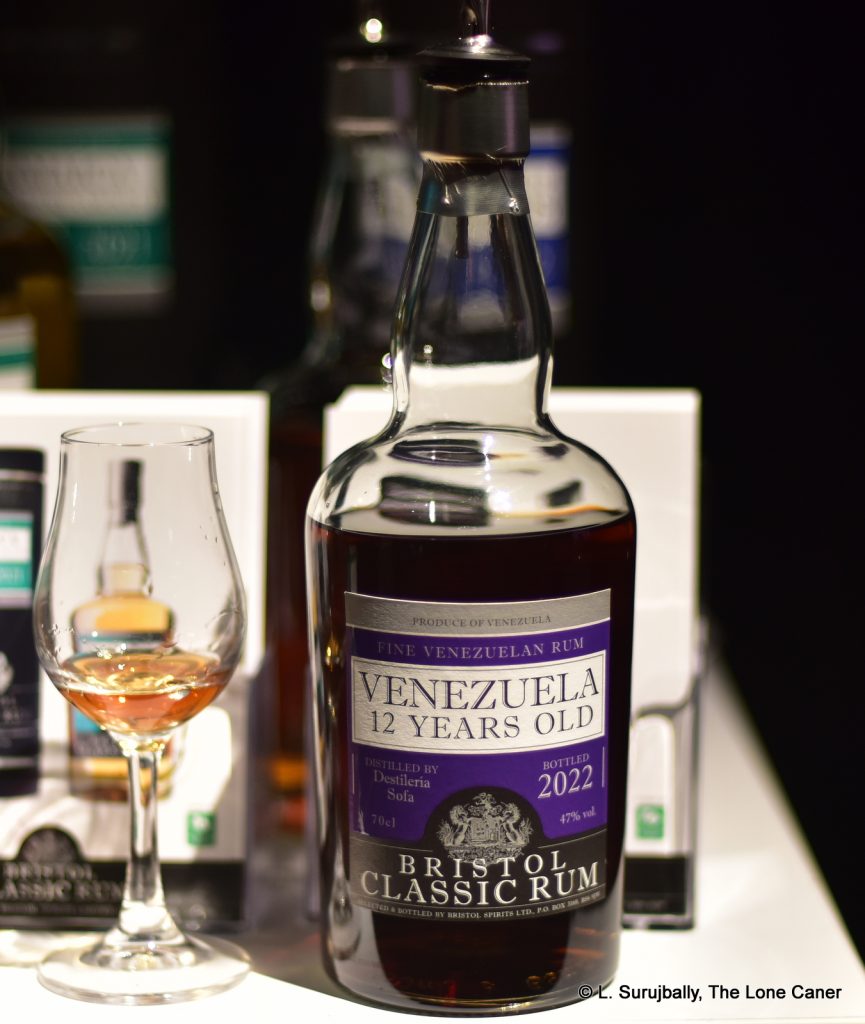Long time readers of this site will know something of my movement away from softer Spanish/Latin style rons over the years. There’s nothing particularly deficient about many of them (only some), and I have a soft spot for quite a few. It’s just that I find most quite unadventurous, occasionally boring, sometimes added-to — though of course they all have their adherents and supporters who buy them and keep the distilleries humming. At most, one can cast aspersions on their escutcheon with matters having to do with disclosure and/or adulteration, something which companies like La Hechicera and Dictador out of Colombia, Malecon from Panama and Mombacho out of Nicaragua (there are several others) have often been the target of. That does not mean, however, that they’re all bad, and it would be a mistake to tar them all with the same brush of indifference and despite.
These thoughts occurred to me because I was forced to take an honest look at what these too-often mild-as-milkwater rums could do when done well, when I tried one that Bristol Spirits — one of the more venerable of the modern independents — had sourced from Venezuela. The exact distillery it comes from is something of a mystery (more on that below); and it is a column still, molasses-based spirit, aged 12 years in refill American oak (ex-bourbon and in both Venezuela and Europe), un-chill-filtered, unadded-to and released at a robust 47% ABV…which I suggest is somewhat uninspiring and which Bristol calls “just about right”.
 They may be on to something there, because frankly, there is little to find fault with. The rum is crisp and tangy, with aromas jumping all over the map: initially quite fruity with scents of lemon meringue pie, pineapples, unsweetened yoghurt, bananas, it switches over after a few minutes and presents light caramel, vanilla, flowers and is light enough to present almost as an aged agricole-style rhum. It’s apparent simplicity belies an under-the-hood level of complexity I must confess to not expecting (which may be why John Barrett, Bristol’s owner, was smirking the entire time as I tried it).
They may be on to something there, because frankly, there is little to find fault with. The rum is crisp and tangy, with aromas jumping all over the map: initially quite fruity with scents of lemon meringue pie, pineapples, unsweetened yoghurt, bananas, it switches over after a few minutes and presents light caramel, vanilla, flowers and is light enough to present almost as an aged agricole-style rhum. It’s apparent simplicity belies an under-the-hood level of complexity I must confess to not expecting (which may be why John Barrett, Bristol’s owner, was smirking the entire time as I tried it).
Nose is one thing, though: and many rums of real olfactory promise falter and die on the palate. At 47% this is reasonable sipping territory, which is to say, it won’t try to defenestrate my tongue. Here, it must be conceded that the rum succeeds very nicely. It has a good mouthfeel; it’s tangy and a little sour, yet with a solid underpinning of caramel and chocolate oranges. Ripe Thai mangoes and peaches are in evidence, some light fruit, and here again, it feels like a firm and slightly deeper agricole rhum, musky, a bit tannic, slightly sweet. An interesting amalgam, all summed up by a shortish finish that showed off a last flirt of salt caramel ice cream with fruit bits sprinkled on top, a touch of light brine, some flowers, and it is over way too quickly.
So let’s talk a bit about Bristol, one of the stalwarts of the indie bottling ecosystem, a small company run by one man, John Barrett (he has recently brought in a young man, his son-in-law, to help run things). Bristol was established as far back as the 1990s, at the dawn of the modern rum renaissance, and if you really are curious, the Boys of Rumcast did a great interview with the man just a few weeks ago. Bristol Spirits, along with Renegade and Rum Nation, were the first indies I came into contact with that showed me the directions rum could go, and one of my best memories of the early rums I tried and wrote about, was the terrific PM 1980 25 year old that almost converted a dedicated single-malt lover to rums on the spot. Bristol Spirits has faded from popular acclaim somewhat over the last five years or so, as new, young and aggressive little indies from all over Europe claimed market share and eyeballs of social media, yet they never went away, and their bright and simple labels have been a fixture at many a rumfest where I skulked around, and I’ve never actually had a bad one from the stable.
 Bristol buys barrels like everyone else, trades them and exchanges them and sources stuff here and there, does some tinkering, blending and ageing of their own, holds on to stock they like, bottles stuff they think is ready. With respect to this Venezuelan rum, in my opinion, they hit the sweet spot, because it’s very ready.
Bristol buys barrels like everyone else, trades them and exchanges them and sources stuff here and there, does some tinkering, blending and ageing of their own, holds on to stock they like, bottles stuff they think is ready. With respect to this Venezuelan rum, in my opinion, they hit the sweet spot, because it’s very ready.
This is a rum that defies expectations (especially mine), and is one of the best Latin/Spanish heritage-style rums of my recent memory – in fact, it forces a reconsideration of what these distilleries can do, if juice like this becomes the norm rather than the exception it currently is. The strength is near-perfect, the notes shimmer in simple harmonies that speak of subtle and elegant arrangements which you can almost, but not quite, sense. There’s not a whole lot of oomph going on — consider it a serene chamber piece, not a symphony — and the level of complexity exhibited by a Hampden, for example, is not in evidence. Yet somehow it goes beyond all that, and at the end, it works, it tastes great and you enjoy it, and isn’t that what counts?
(#928)(85/100) ⭐⭐⭐⭐
The Distillery
The producer noted on the label is stated as being “Destileria Sofa” which seems straightforward enough, except that you’ll never find a distillery of that name in Venezuela (and believe me, I tried). Rum-X and various European shops make mention of it – always with respect to this very same rum and no other – and some remark it’s located in the NE of the country. But that’s all you get. There’s no mention of the distillery on google, reddit, wikidot or any other resource I can consult…except for one, and so, your intrepid soused reviewer got on to Simon over at Bristol Spirits: he’s the guy who helps me out when Mr. Barrett doesn’t pick up the phone.
Long story short, it’s a distillery that makes a certain well regarded rum possibly named after a 16th century Carmelite nun, which has an association with Bacardi that prohibits it from using its own name on independent bottlings such as Bristol’s. So something similar to the “secret distillery” which Compagnie des Indes sometimes includes on its label, or how “A Jamaican Distillery” is used on occasion to avoid complications with the useage of a name like Worthy Park or what have you. Most of the time you’re given enough to work with, as I was, but I’ll respect the confidentiality in print and not come right out with the name.
All that aside, even though permission was given to use the name of Destileria Sofa on the label as the source for the rum, I still don’t actually know what that represents or means or where the name comes from, so if anyone knows any better, or can provide information from Venezuela, feel free to send it along and I’ll add it to these notes.
Other Notes
- After this review went up, Mads Heitmann, who runs the Danish webshop Romhatten, commented that the rum was tested at 10-11g/L sugar which he later confirmed with Bristol Spirits. If this is so (I have an outstanding email to them) it won’t change the review, which is locked, but it would explain something of the slight voluptuousness and sweetness the rum displayed, even if not particularly unpleasant in any way.

Destilería SOFA is actually Santa Teresa, though due to their Bacardi association, they cannot make it public that their rums are used in other bottlings. Source: I have a friend who works in Santa Teresa and confirmed t.
Thank you for solving the mystery.
I tried the 8 y-o rum and it is very good. I was surprised that such inconspicuous rum could be this good. Now I need to find the 12 y-o.
Plantation has released a very similar bottling at 52%.